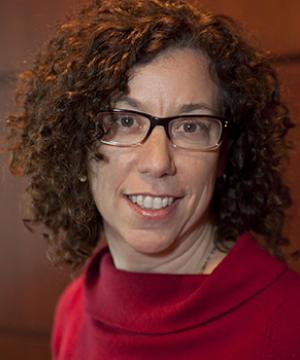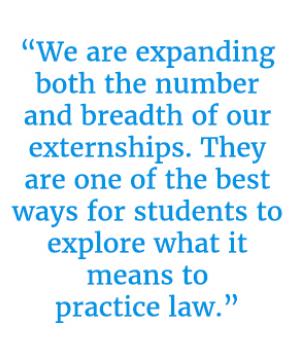Columbia Law Expands Externship Offerings
To ensure real-world learning opportunities for students interested in every area of legal practice, Columbia Law School is diversifying and expanding its externship program. The Law School has established new externships at the Brooklyn and Manhattan district attorneys’ offices; the Legal Aid Society; the New York Attorney General's antitrust enforcement division, and the Knight First Amendment Institute at Columbia University, a nonprofit, nonpartisan organization that tackles freedom-of-press-and-speech issues through strategic litigation, research, and public education. The Law School also is piloting other experiential learning opportunities during the spring 2019 semester.
The Law School's 27 externships provide 10 to 15 hours of supervised fieldwork, along with a companion seminar, and all count toward the American Bar Association requirement that J.D. students have six experiential credits to graduate.
Antitrust Law
The New York State Office of the Attorney General Antitrust Enforcement externship delves into how questionable business practices—such as monopolization schemes, cartels, mergers, and other arrangements that threaten to raise prices for consumers—are challenged or litigated by the state. “This externship focuses on substantive issues and will appeal to students who plan to plan to work in corporate law as well as the public sector,” says Kraham.
Housing Law
In the new Housing Law externship at the Legal Aid Society’s Civil Practice, students will represent low-income tenants in New York City who have recently been guaranteed the right to counsel in eviction proceedings. “Many students are interested in social justice and defense work, and this is a chance for them to do just that,” says Kraham, adding that students will also work with tenant associations and on community outreach.
Criminal Prosecution
The new Criminal Prosecution externship with the New York County District Attorney’s Office (Manhattan) and the Kings County District Attorney’s Office (Brooklyn) allows students to explore state law and courts. “At the environmental clinic, we argued cases in both state and federal courts, and they have different structures and different crimes,” she says. “This externship offers students a wide variety of cases to work on.”
First Amendment
The Knight First Amendment externship, which was inaugurated this fall, will be offered in the spring, too. “You can think of the Knight Institute as a law firm where students work with staff lawyers,” says Kraham. “They are looking at First Amendment issues in the digital age—like cell phone tracking and internet privacy—at a very high level. Students there tell me they are having a great experience.”
The Law School is also expanding its full-semester program in the capital. Students in the Externship on the Federal Government in Washington, D.C. now have the option to work at select NGOs beginning this spring. “Like our government placements, the externships at nonprofits will provide an experience unique to the capital,” says Kraham.
Pilot seminars
Furthermore, two new seminars this spring will provide experiential credits and function as pilots for future externships. For the first time, the two-credit seminar, Exploring the Role of the General Counsel, will give students the option of having a field placement at a general counsel’s office (students will earn two extra credits). Representing Nonprofit Organizations: A Lawyering Skills Simulation Course will provide training in interviewing and counseling transactional clients, negotiation, drafting contracts and governance policies, and other skills.
Meanwhile, Kraham has been meeting with students to explore what other types of field placements interest them and reaching out to organizations and agencies in areas that have not been represented in Columbia Law’s externship program. “I have been talking to hospitals, cable companies, newspapers, and professional sports leagues,” she says. “We want to make sure students have many choices.”
###
Applications for all 18 spring externships— as well as for clinics—are due at 5 p.m. on Tuesday, October 16.
Read more: Columbia Law Expands Experiential Offerings

